Irrawaddy Online
New Generation of Tatmadaw Officers Needed to Promote Change [Commentary]
By Ye Htut
November 20, 2007
Email Article
Print Article
A new generation of officers in the Tatmadaw (armed forces) have a golden opportunity to restore their status as true heroes of Burma and to rectify the failures of previous military leaders.
Following the government’s brutal suppression of peaceful protests led by monks, a return to the status quo is unacceptable to most Burmese.
Despite Snr-Gen Than Shwe’s preconditions for direct talks with the opposition leader, Aung San Suu Kyi, venues for a national reconciliation process are being explored and preliminary stages are already underway, partly due to mediation efforts by the special UN envoy Ibrahim Gambari and the support of the international community, especially the governments in the region.
Despite valid suspicions regarding Than Shwe’s commitment to reconciliation, the current negotiations between Suu Kyi and the government’s liaison minister, Aung Kyi, have the potential to lead to a viable path towards genuine national reconciliation.
To this end, redoubled efforts by the international community alone are not enough. An internal push from the newer generations of military officers is also necessary.
The Tatmadaw has a critical role to play in the emergence of a national constitution that would be acceptable to the majority of people.
What the UN special envoy has proposed to break the political deadlock is that the military leaders and the opposition led by Suu Kyi make a constitutional compromise.
Suu Kyi, who is the daughter of the founder of the Tatmadaw and cares about its image, has publicly announced that she could cooperate with the Tatmadaw and stressed the importance of national unity.
The armed forces, as the strongest institution of the Union, have a historic calling to ensure that it is not an obstacle to a constitutional compromise and reconciliation process. Instead, it must be a significant part of the process and the solution.
A unique problem is the lack of a constitution that protects the people. The void has been filled by the current leadership, under Than Shwe, in forging absolute dominance over civil society.
The new generations of officers must realize that the concept of the Tatmadaw as the sole backbone of the Union was first devised by the late Gen Ne Win as a means to achieve solidarity among the post-independence, left-wing politicians and has proved to be ineffectual. It only led to the formation of a series of military dictatorships without any advancement in the political or socio-economic areas.
Than Shwe is now using this concept in an attempt to establish a military-backed, monarchy-style rule following the breakdown of the socialist constitution. Statues of three prominent kings from Burmese history erected in the new capital Naypyidaw reflect how he sees his role.
Than Shwe is ruthless. He has annihilated all obstacles in the way of achieving absolute state power. Such conduct is not acceptable by any standard of sovereign countries.
There is a clear danger the Union may become a failed state if the army continues to follow the current direction of militarization under Than Shwe's leadership. On the other hand, it is recognized that there is a high risk of the Union descending into anarchy if overzealous, abrupt changes in the political system take place.
The people of the Union need the armed forces to serve and protect them with respect to civil society and a democratic constitution. The new generation of officers who are an integral part of the Union must grasp this opportunity to facilitate constitutional compromises and the process of reconciliation.
A professional military is a necessity that must be preserved for external threats to the state. It can be legitimately called upon by the Union under the constitution, if the police force alone is incapable of restoring civil order.
But, with no constitution to protect the people, Than Shwe has ordered the military to use arms against innocent civilians who engaged in a democratic process by staging peaceful protests.
The Tatmadaw must realize that the current demonstrations are not aimed at the military as an institution. Instead, they are directed at the disproportional use of force with impunity by Than Shwe as the head of the government.
Therefore, it should be the duty of every new generation of officers to educate the soldiers under their command and convince their superiors that the time has come to answer the historic call for constitutional compromises and a process of national reconciliation.
They must realize that the proposed draft constitution is only going to lead to the prolonging of the status quo. Without change, another uprising by the people is inevitable.
In the absence of an infrastructure for a civilian authority, the risk of the Union disintegrating into multiple military factions is real once the current form of central military dictatorship one day comes to an end.
Therefore, the army should take a proactive position and form a committee representing the people’s parliament headed by Suu Kyi, to be added to the recently formed constitutional review committee. This would facilitate the initiation of an all-inclusive, transparent dialogue.
In addition, the formation of a poverty alleviation committee as suggested by Gambari could serve as a vehicle to channel much needed financial aid to the Union while circumventing international sanctions directed towards the SPDC.
The Tatmadaw must be prepared to change its direction and march hand-in- hand with the Burmese people towards the emergence of a constitution acceptable to the people of the Union.
Only then can the Tatmadaw restore its image as a protector of the union and the people.
The writer comes from a family of Tatmadaw officers.
Tuesday, 20 November 2007
Subscribe to:
Post Comments
(
Atom
)





















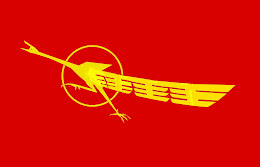





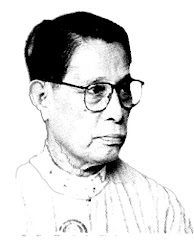


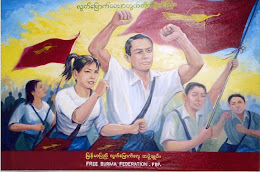





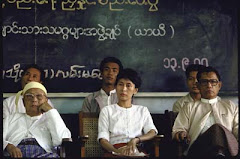

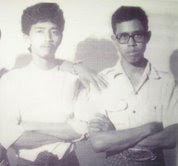

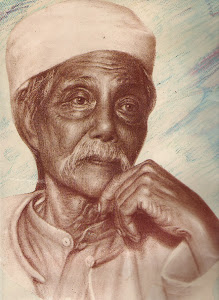
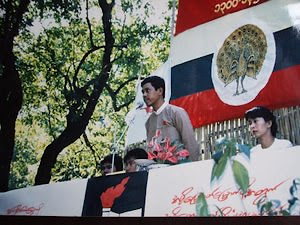
No comments :
Post a Comment